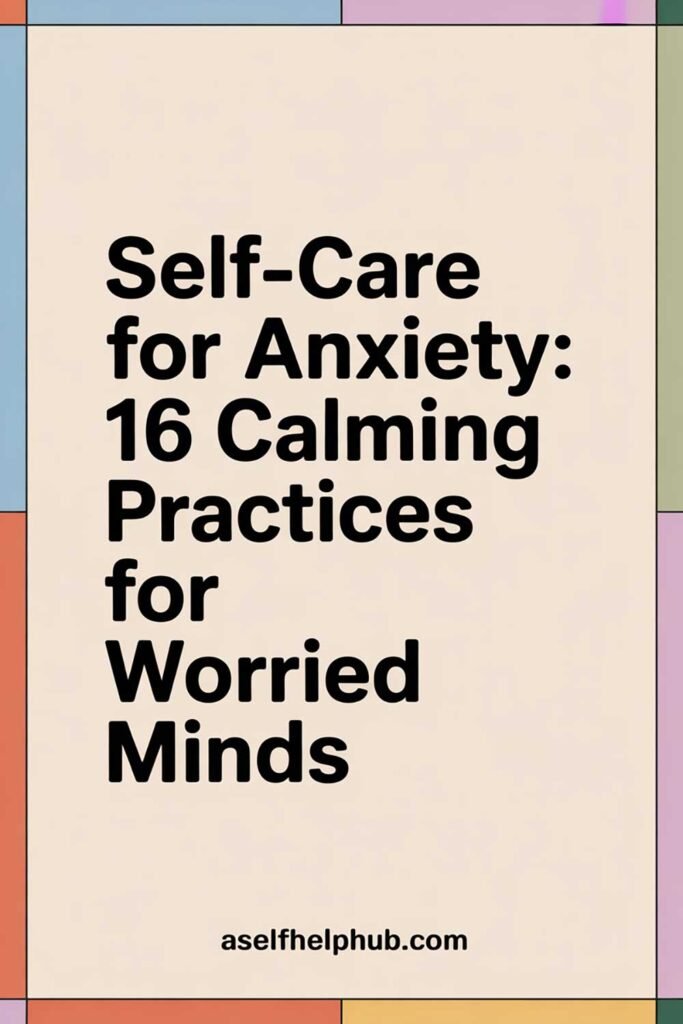
The Unseen Muscle: My Daily Routine for Cultivating Unshakeable Self-Discipline and Achieving What Truly Matters
Have you ever looked at highly successful individuals – those who consistently hit their goals, maintain healthy habits, and seem to effortlessly navigate life’s challenges – and wondered, “What’s their secret?” Is it boundless willpower? Innate talent? Or some hidden magical ingredient that the rest of us simply don’t possess? For a long time, I believed that self-discipline was a trait you were either born with or forever lacked. My days often felt like a series of battles with my own procrastination, impulsive desires, and the overwhelming urge to just “start tomorrow.”

I knew what I should do: exercise, eat healthy, work on my passion project, save money, learn new skills. But the gap between knowing and doing felt like an insurmountable chasm. My mornings were a hit-or-miss affair, my afternoons melted into digital distractions, and evenings often ended with a sense of regret and the familiar promise to “do better tomorrow.” This constant internal struggle was exhausting, eroding my confidence and leaving me feeling perpetually behind schedule and unfulfilled. I yearned for the focus, consistency, and inner strength that true self-discipline seemed to offer.
The profound truth I’ve come to understand is this: Self-discipline is not a fixed personality trait. It’s a muscle. And like any muscle, it can be developed, strengthened, and refined through consistent, intentional effort. It’s not about being perfect, but about building a series of small, daily habits that, over time, rewire your brain, fortify your willpower, and align your actions with your long-term goals. The journey from feeling perpetually undisciplined to possessing a quiet, powerful inner strength wasn’t a sudden, dramatic transformation. It was a gradual, deliberate process, built brick by brick, habit by habit.
This comprehensive guide is designed to share my personal blueprint for cultivating unshakeable self-discipline. I’ll walk you through my exact daily routine, breaking down each component, explaining its psychological underpinnings, and providing real-life examples of how these practices have transformed not just my productivity, but my entire life. Get ready to stop relying on fleeting motivation and start building the consistent, disciplined habits that will empower you to achieve your wildest aspirations.
Beyond Willpower: Understanding the True Nature of Self-Discipline
Before we dive into the routine, let’s clarify what self-discipline truly is, because it’s often misunderstood. It’s not about being a robot, devoid of desires. It’s not about harsh self-punishment.
As discussed in What is Self-Discipline: A Beginner’s Guide, self-discipline is the ability to:
- Control your impulses: Resisting immediate gratification for long-term benefit.
- Delay gratification: Prioritizing future rewards over instant pleasure.
- Manage your thoughts and emotions: Directing your focus and energy intentionally.
- Persist in the face of obstacles: Staying committed even when it’s difficult or uncomfortable.
- Align actions with values and goals: Consistently doing what you know you should do, even when you don’t feel like doing it.
Think of it less as a restrictive force and more as a liberating one. It frees you from the tyranny of impulse, allowing you to proactively design your life rather than reactively living it. It’s the ultimate tool for translating dreams into reality.
The Pillars of My Self-Discipline Daily Routine: Consistency Over Perfection
My daily routine isn’t rigid to the minute, but the sequence and presence of specific habits are non-negotiable. It’s about showing up, consistently, even on days I don’t feel like it. This consistency is the actual workout for the self-discipline muscle.
Phase 1: The Morning Citadel (The First 60-90 Minutes)
The first hour or two of your day are disproportionately powerful. They set the tone, create momentum, and are often the easiest time to assert control before external demands take over. This phase is about proactive creation, not reactive response. (For more on this, check out My Morning Routine for Calm, Clarity, and Focus).
1. The Alarm & Immediate Hydration (5 minutes)
- The Habit: My alarm is a gentle, progressive sound, set across the room from my bed. This forces me to physically get up to turn it off, immediately breaking the snooze cycle. Before anything else, I head straight to the kitchen for a large glass (16-20 oz) of water, which I drink consciously.
- Why it Cultivates Self-Discipline:
- Small Win, Big Momentum: Getting out of bed immediately and hydrating are tiny, yet powerful, acts of self-control. It proves to yourself, first thing, that you can follow through on an intention. This immediate “win” creates positive momentum for the rest of the day.
- Breaks Impulse Cycle: Placing the alarm away prevents the reflexive snooze button hit. Hydration jumpstarts the body and mind, making it harder to crawl back under the covers.
- Physical Cue: The act of drinking water becomes a physical cue that the day has begun, shifting gears from sleep.
- Real-Life Example: For years, David struggled with hitting snooze 5-6 times, leaving him feeling rushed and stressed. He started placing his phone in his bathroom. The first few days were hard, but the discomfort of getting out of bed quickly faded into a sense of accomplishment. “Just getting up on the first alarm felt like a huge victory,” he shared. “That feeling of early success made me want to keep that momentum going through the rest of my morning.”
2. Sacred Stillness & Breathwork (10-15 minutes)
- The Habit: Immediately after hydrating, I sit in a quiet space (often just a cushion on the floor) for 10-15 minutes. This time is strictly for stillness, typically focused on my breath. I use a simple timer. No phone, no music, no news. Thoughts inevitably arise, but I simply observe them without judgment and gently return my attention to my breath.
- Why it Cultivates Self-Discipline:
- Impulse Control Training: Resisting the urge to grab your phone, check emails, or start planning trains your prefrontal cortex – the part of the brain responsible for impulse control.
- Mindful Awareness: Learning to observe thoughts without reacting allows you to detach from emotional impulses throughout the day. This is crucial for responding thoughtfully rather than reactively.
- Reduces Decision Fatigue: By delaying engagement with external stimuli, you conserve mental energy for important decisions later in the day. You set the agenda for your mind, rather than letting it be set by others.
- Real-Life Example: Emily, a busy executive, found her mind constantly racing. Her meditation practice felt like a battle initially. But by consistently showing up for just 10 minutes, she started to notice a shift. “The mental space created by that stillness felt like a superpower,” she said. “I found myself less easily rattled by stressful emails or sudden demands at work because I had trained myself to observe my reactions without immediately being swept away by them.”
3. Intentional Movement (20-30 minutes)
- The Habit: This phase involves deliberate physical activity. For me, it’s often a brisk walk outdoors, a gentle yoga flow, or a short bodyweight strength session. It’s not about punishing myself, but about awakening my body and mind. It’s also a fantastic way to boost your overall well-being, as physical movement is a core component of building confidence, as detailed in my other article, 5 Daily Habits That Increased My Confidence.
- Why it Cultivates Self-Discipline:
- Follow-Through on Intentions: Committing to physical movement, even when you’d prefer to stay sedentary, builds the muscle of follow-through. It reinforces that you are the one in charge of your actions.
- Energy Regulation: Consistent movement stabilizes mood and energy levels, reducing reliance on external stimulants (like excessive caffeine) and making it easier to sustain focus later.
- Overcoming Resistance: Pushing past the initial inertia of starting a physical activity directly trains your ability to overcome resistance in other areas of life.
- Real-Life Example: Jessica, a freelance designer, often struggled to get her creative juices flowing. She started a 25-minute morning walk. “There are days when I just don’t want to go,” she admits. “But forcing myself to take that first step has become a metaphor for my work. If I can get myself out the door, I can get myself to start that difficult design project. The physical discipline translates directly to mental discipline.”
4. Focused Planning & Prioritization (15-20 minutes)
- The Habit: I sit down with my planner (digital or physical) and, without opening email or social media, review my overarching goals. I then identify my 1-3 Most Important Tasks (MITs) for the day – the tasks that, if completed, would make the biggest impact. I briefly plan how I’ll tackle them, perhaps time-blocking them in my calendar.
- Why it Cultivates Self-Discipline:
- Proactive vs. Reactive: This habit forces you to be proactive about your day, rather than letting external demands dictate your actions. It’s a deliberate act of choosing your priorities.
- Decision Fatigue Prevention: By deciding what to do and when to do it before the chaos begins, you conserve willpower and mental energy for actual execution.
- Clarifies Intentions: A clear plan makes it harder to get sidetracked. You know what you should be doing, even when distractions arise.
- Real-Life Example: Tom, a sales manager, used to arrive at his desk and immediately dive into emails, often getting pulled into low-priority tasks. By consistently taking 15 minutes to identify his MITs – for example, “Call potential client X,” “Finalize proposal for Y,” – he found he tackled those high-impact tasks first. “It’s a small chunk of time that prevents me from wasting hours,” he explained. “My self-discipline in planning directly leads to my discipline in execution.”
Phase 2: The Daily Grind (During the Workday/Main Activity Blocks)
Self-discipline isn’t just a morning affair. It needs to be maintained throughout the day, especially when distractions are rampant and the siren call of instant gratification beckons.
5. The Single-Tasking Sprint & Distraction Blocking (Throughout the Day)
- The Habit: For focused work, I implement “single-tasking sprints” (like the Pomodoro Technique). I set a timer (e.g., 25-50 minutes) and commit to working on one task only, with no interruptions. My phone is on silent, out of reach. All unnecessary tabs and applications are closed. During the short breaks, I step away from the screen entirely.
- Why it Cultivates Self-Discipline:
- Resisting Multitasking Impulse: The urge to switch tasks is powerful. Committing to single-tasking trains your brain to focus and resist internal and external distractions.
- Overcoming Procrastination: Breaking down large tasks into manageable sprints makes them less daunting and easier to start.
- Protecting Focus: Proactively eliminating distractions (notifications, open tabs) removes the need for constant willpower. You’re designing your environment for success.
- Real-Life Example: Mark (from the stillness example) struggled with maintaining focus on long coding projects. He started using 45-minute focused sprints. “It’s like I’m telling my brain, ‘Okay, for these 45 minutes, it’s just you and the code. No social media, no checking news.’ The immediate gratification of seeing the timer counting down, combined with the visible progress, makes it easier to stay disciplined. I actually get more done in two focused hours now than I used to in a whole scattered day.”
6. Scheduled Breaks & Mindful Transitions (Throughout the Day)
- The Habit: Instead of taking breaks only when I feel exhausted, I proactively schedule them. After a focused work sprint, I take a short, intentional break (5-10 minutes). This might involve stretching, walking away from my desk, hydrating, or simply looking out the window. Longer breaks are for lunch, exercise, or connecting with loved ones. I also practice mindful transitions between tasks. Before moving from email to a creative project, I take a deep breath and consciously shift my mental gears.
- Why it Cultivates Self-Discipline:
- Sustainable Effort: Disciplined breaks prevent burnout. They allow your willpower reserves to replenish, making it easier to return to focus.
- Prevents “Zombie Mode”: Mindless scrolling during breaks can sabotage your discipline. Intentional breaks keep you in control of your downtime.
- Maintains Momentum: Smooth transitions reduce mental friction and make it easier to start the next task with purpose.
- Real-Life Example: Chrissy, a remote worker, found herself working for hours without a break, leading to severe burnout. She now sets a timer for every 90 minutes. When it rings, she stands up, stretches, and walks away from her desk for 10 minutes. “It feels counterintuitive to stop when I’m in flow,” she says, “but I actually get more done because my focus is sustained for longer periods. It’s disciplined rest that fuels disciplined work.”
7. Mindful Eating & Financial Awareness (Mid-day Check-in)
- The Habit: My lunch break isn’t just about refueling my body; it’s a moment to practice mindful eating and a quick financial check-in. I try to eat away from my screen, focusing on my food and its nourishment. I also take a quick glance at my budget for the day or week, especially in categories prone to impulse spending, like food. This reinforces the discipline needed to manage expenses, similar to strategies used in How to Feed a Family of 4 for $400 a Month.
- Why it Cultivates Self-Discipline:
- Resisting Impulse: Mindful eating helps curb impulsive snacking or overeating. Checking the budget reinforces financial discipline, preventing the “just one more thing” creep.
- Connecting Actions to Goals: This brief check-in links daily spending habits directly to larger financial goals, making disciplined choices feel more meaningful.
- Holistic Discipline: It integrates physical well-being and financial responsibility into the daily flow, demonstrating that discipline extends beyond just work.
- Real-Life Example: Sarah (from the morning example) used to grab quick, often expensive, lunches. She started packing her lunch and eating it away from her desk, focusing on the food. During this time, she’d also quickly check her budgeting app. “It’s incredible how much easier it is to resist that urge for takeout when I’ve just mindfully eaten a good lunch and seen how much I’ve already saved for my goals this month,” she shared. “It’s a double whammy of discipline.”
Phase 3: The Evening Recalibration (The Last 60-90 Minutes)
How you end your day is just as important as how you start it. This phase is about reviewing, releasing, and preparing for optimal rest and the next day’s discipline.
8. The End-of-Day Review & Next-Day Prep (10-15 minutes)
- The Habit: Before shutting down for the day, I dedicate 10-15 minutes to reviewing what I accomplished, transferring any unfinished tasks to the next day’s plan, and creating a preliminary plan for tomorrow’s MITs. I specifically avoid opening new emails or starting new tasks.
- Why it Cultivates Self-Discipline:
- Closes the Loop: This ritual provides a sense of closure, preventing lingering work thoughts from disrupting my evening. It acknowledges progress, which is a powerful motivator.
- Reduces Morning Resistance: Waking up with a clear plan significantly reduces morning decision fatigue and makes it easier to start the day with discipline.
- Avoids Procrastination Creep: Unfinished tasks are systematically moved, not just forgotten, which maintains accountability.
- Real-Life Example: Lisa used to end her workday feeling overwhelmed, with a chaotic mental list of what she “should” have done. Now, her end-of-day review helps her release that pressure. “I write down my wins, even small ones,” she explains. “Then I transfer unfinished tasks and briefly plan tomorrow. It means I can truly ‘switch off’ because my brain knows everything is handled. It’s a disciplined way to prevent anxiety from carrying over.”
9. Digital Sunset & Wind-Down (60 minutes before bed)
- The Habit: At least an hour before bed, all non-essential screens (phone, laptop, TV) are turned off. I engage in relaxing activities: reading a physical book, gentle stretching, listening to calming music, or spending quality time talking with my partner. My bedroom is kept dark, cool, and quiet.
- Why it Cultivates Self-Discipline:
- Prioritizes Rest: Resisting the urge to endlessly scroll or watch another episode is a direct act of prioritizing good sleep – the foundation of all discipline.
- Improves Sleep Quality: Reducing blue light exposure and mental stimulation allows the body to produce melatonin and prepare for restorative sleep.
- Replenishes Willpower: Good sleep is crucial for restoring willpower. This disciplined wind-down makes it easier to engage in morning discipline the next day.
- Real-Life Example: Andrew, a busy professional, found himself scrolling on his phone until he fell asleep, often waking up groggy. He started a “digital sunset” at 9 PM. He replaced social media with reading. “The first few nights were tough, almost like withdrawal,” he admits. “But now, I fall asleep faster, sleep deeper, and wake up feeling genuinely rested. That consistent, disciplined sleep makes all my other habits easier to stick to.”
The Mindset Shift: From “I Should” to “I Choose”
Cultivating self-discipline isn’t about rigid perfection; it’s about making conscious choices, consistently. It’s about understanding that every small act of disciplined follow-through strengthens your internal capacity. Embrace the discomfort, celebrate the small wins, and remember that every moment you choose intentional action over impulsive reaction, you are building an unstoppable version of yourself. This is the path to freedom, not restriction.
Picture This…
Imagine waking up feeling refreshed, not driven by an external alarm, but by your own internal clock. Your morning unfolds with a calm, deliberate rhythm – moments of quiet reflection, invigorating movement, and crystal-clear planning. As the day progresses, you move through your tasks with focused intention, effortlessly resisting distractions because your environment is optimized and your brain is trained. You manage challenges with a quiet confidence, knowing you have the inner strength to push through discomfort. By evening, you transition smoothly into restorative rest, free from the nagging feeling of unfinished business. This isn’t just about getting more done; it’s about reclaiming your time, mastering your mind, and forging an unshakeable self-discipline that empowers you to create the extraordinary life you truly desire.
20 Powerful Quotes on Self-Discipline
- “Discipline is the bridge between goals and accomplishment.” – Jim Rohn
- “Self-discipline is the ability to make yourself do what you should do, when you should do it, whether you feel like it or not.” – Brian Tracy
- “The only discipline that lasts is self-discipline.” – Bum Phillips
- “We are what we repeatedly do. Excellence, then, is not an act, but a habit.” – Aristotle
- “The first and best victory is to conquer self.” – Plato
- “Without self-discipline, success is impossible, period.” – Lou Holtz
- “Self-discipline is about controlling your desires and impulses to make better long-term decisions.” – Unknown
- “The ability to discipline yourself to delay gratification in the short term in order to enjoy greater rewards in the long term is the indispensable prerequisite for success.” – Brian Tracy
- “Suffer the pain of discipline or suffer the pain of regret.” – Jim Rohn
- “Discipline is remembering what you want.” – David Allen
- “The ultimate form of power is self-control.” – Unknown
- “Energy and persistence conquer all things.” – Benjamin Franklin
- “Motivation is what gets you started. Habit is what keeps you going.” – Jim Ryun
- “Lack of direction, not lack of time, is the problem. We all have twenty-four hour days.” – Zig Ziglar
- “You will never change your life until you change something you do daily. The secret of your success is found in your daily routine.” – John C. Maxwell
- “Through discipline comes freedom.” – Aristotle
- “It’s not what we do once in a while that shapes our lives, but what we do consistently.” – Tony Robbins
- “The best way to predict the future is to create it.” – Peter Drucker
- “Tough times never last, but tough people do.” – Robert H. Schuller (Toughness built through discipline).
- “If you can control your mind, you can control your body. If you can control your body, you can control your life.” – Unknown
Disclaimer
Please note: This article is for informational purposes only and is based on personal experiences, common productivity principles, and anecdotal evidence. While the described routine and habits have been highly effective for the author and many others, individual results may vary. This content is not a substitute for professional medical advice, psychological counseling, or diagnosis/treatment of specific conditions like ADHD, chronic fatigue, or sleep disorders. If you are struggling with persistent lack of motivation, severe procrastination, or mental health concerns, please consult with a qualified healthcare professional. Always consider your unique circumstances and health needs.
Share This Article!
Are you ready to unlock your own powerful self-discipline and achieve your biggest goals? If this daily routine has inspired you, please share it with friends, family, or on your social media! Let’s empower more people to cultivate the habits that lead to lasting success and fulfillment.






